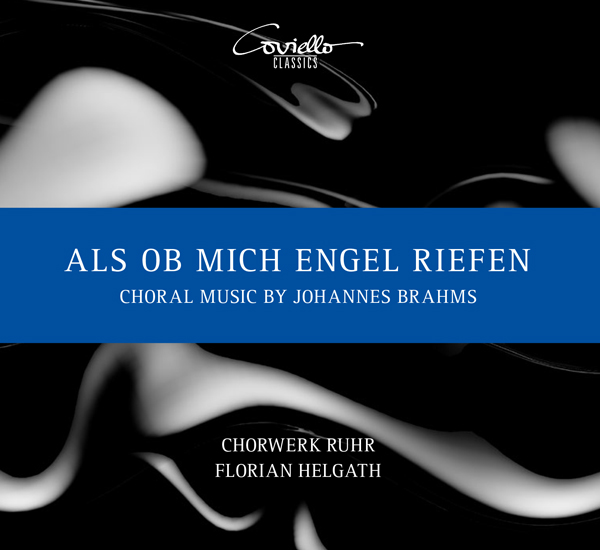
ALS OB MICH ENGEL RIEFEN
Chorwerk Ruhr
Edition: Coviello Classics
Booklet: de / en
Media: CD / HD Download
The genre accompanied him for almost his entire creative career: the sacred choral song op. 30 was written by the 23-year-old Johannes Brahms in 1856, the Fünf Gesänge for mixed choir a cappella are his late legacy in the field of secular choral song, composed between 1886 and 1888. In between lie the Drei Gesänge, composed at a time when Brahms was also very practically involved with choral singing as a choirmaster, then the Sieben Lieder for four to eight-part choir and finally his large-scale Mottete op. 74, No. 1 Warum ist das Licht gegeben from 1877 and the sister work O Heiland, reiß die Himmel auf op. 74 No. 2. Over the course of more than 30 years, the composer showed a fascinating development which – of course always in the most demanding style – led from the romantic opulence of the six- to eight-part movement to more reduced austerity. Chorwerk Ruhr traces this development with fascinating intensity.
| Johannes Brahms (1833 – 1897) | ||
| Sieben Lieder op. 62 | ||
| 1. | I Rosmarin | 2:10 |
| 2. | II Von alten Liebesliedern | 2:17 |
| 3. | III Waldesnacht | 5:25 |
| 4. | IV Dein Herzlein mild | 2:07 |
| 5. | V All meine Herzgedanken | 3:12 |
| 6. | VI Es geht ein Wehen | 2:27 |
| 7. | VII Vergangen ist mir Glück und Heil | 3:39 |
| Drei Gesänge op. 42 | ||
| 8. | I Abendständchen | 2:05 |
| 9. | II Vineta | 2:59 |
| 10. | III Darthulas Grabesgesang | 4:32 |
| 11. | In stiller Nacht aus: 14 Deutsche Volkslieder, WoO 34, Nr. 8 | 2:14 |
| Fünf Gesänge op. 104 | ||
| 12. | I Nachtwache 1 | 2:29 |
| 13. | II Nachtwache 2 | 1:21 |
| 14. | III Letztes Glück | 2:10 |
| 15. | IV Verlorene Jugend | 1:58 |
| 16. | V Im Herbst | 5:29 |
| Zwei Motetten op. 74 Nr. 1 | ||
| 17. | I Warum ist das Licht gegeben | 5:08 |
| 18. | II Lasset uns unser Herz | 1:08 |
| 19. | III Siehe wir preisen selig | 2:16 |
| 20. | IV Choral | 1:20 |
| Zwei Motetten op. 74 Nr. 2 | ||
| 21. | I O Heiland reiß die Himmel auf | 0:38 |
| 22. | II O Gott ein Tau | 0:46 |
| 23. | III O Erd schlag aus | 0:55 |
| 24. | IV Hier leiden wir | 1:38 |
| 25. | V Da wollen wir all danken dir | 1:16 |
| 26. | Geistliches Lied op. 30 Peter Kofler, Orgel / organ |
5:09 |
| Total time: | 1:07:05 | |
